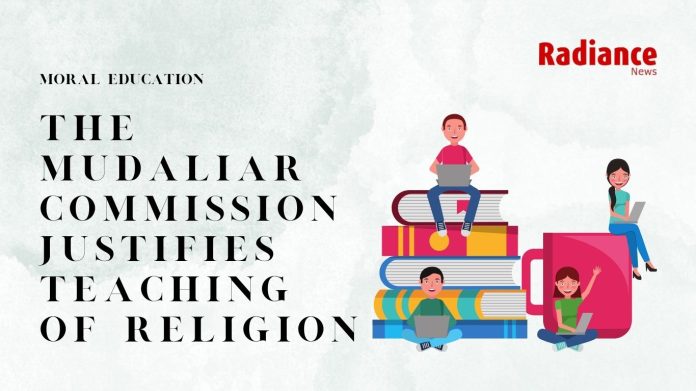
The Mudaliar Commission also justified the teaching of religion. The question posed by some readers about this series of our articles was how much of this discussion or study will help change the contours of moral education in our country. The simple answer is that we want to formulate and design a system that guides one on how to teach moral science or how to establish moral education in educational institutions. This system will be implemented in schools. It is another matter that this proposed system should also get support from society and parents.
A school is a legally recognized institution of learning. Schools are supervised by state education boards or education boards established by the central government. Whether it is the state or central board, they monitor the activities in schools. They retain the right to take necessary action against activities that conflict with the education policy of the government. The boards are authorized to issue programs in schools as mentioned in the approved education policy of the government and other education-related documents. Any policy and program formulated by the government related to moral education has an impact on the moral education imparted in schools.
The second and more important thing is that governments around the world are gradually looking at ways and means to control certain domains of life. Among these domains is the field of education. Generations receive nurture, care and thrive in schools. The thoughts, thinking, social makeup and political ideology of a nation do not depend only on the education of physics, chemistry, biology, mathematics or other technical subjects, rather they are based on the social science subjects taught in schools and these lay the foundations of moral education among students. They play a fundamental role in the formation of thoughts, morals and attitudes of the society and the country. Therefore, we must review our policies as policies represent the framework or the outcome of our collective efforts about a certain domain of life.
A quick survey of the current educated generation presents a very alarming situation. As those who wish well for the nation, it is incumbent upon us to present our opinion before the people on where we have exhibited weakness and where we have failed in the field of education and what corrective measures we have to take when we stumble. This is mandatory because we are a missionary group. So far, we have examined one committee and one commission on moral and religious education. This article introduces the Mudaliar Commission set up to review Higher Secondary Education.
Secondary Education Commission
“The Secondary Education Commission appointed by the Government of India vide Resolution No. F. 9-5/52-B-1, dated 23 September 1952. The Commission was inaugurated by the Hon’ble Minister of Education, Maulana Abul Kalam Azad, on the 6th October 1952 in New Delhi” At that time, Maulana Abul Kalam Azad addressed the inaugural meeting of the commission. However, the report does not record the points delivered in Maulana’s inaugural address. We have suggested earlier that those interested must research this topic – “Maulana Azad as Education Minister”.
This commission, formally named the “Secondary Education Commission” was headed by Dr A Lakshmanswami Mudaliar, Vice-Chancellor of Madras University, hence this commission is also known as the Mudaliar Commission. The commission prepared its report in less than a year and submitted it to the Ministry of Education in June 1953. The 279-page document also presents the educational landscape of that period and how the academics and policymakers of the period saw India’s future. From page 97 to page 107 of this report, the chapter “The Education of Character” is spread over 10 pages. This chapter is further divided into sub-topics; some of the important ones are summarized here:
The Basic Principles
Under this sub-topic, the Commission has presented brief and comprehensive views on the objectives of education, the theory of education in independent India, the role of education in nation-building, and the role of education and students in the formation of society. A paragraph in the report describing the purpose of education reads as follows:
“In dealing with the aims and objectives of education, we have made it clear that the supreme end of the educative process should be the training of the character and personality of students in such a way that they will be able to realize their full potentialities and contribute to the well-being of the community. One of the main criticisms against modern education is that, by concentrating too much on examinations, enough attention is not devoted to activities that promote the formation of character and inculcate ideals, which make for personal integrity and social efficiency.”
This observation of the commission, which it presented in 1953, is still relevant today. The commission believed that the focus of education should have been on personality development. It has been ignored and hence students lack social skills.
Need for Cooperation between Schools and Community
There should be cooperation between schools and society. A school is a representative of the wider society. Society influences schools and the reformation of society takes place through schools is an undeniable reality. Therefore, there should be a mutual connection between the two.
The report says, “In the great debate that has been going on for decades between those who hold that education must only seek to adjust the individual to his environment and those who think that it should be an agency for the “superior reconstruction” of the environment and its pattern of life, we are definitely on the side of the dynamic and creative view of education. We are convinced that it is the business of the school to train individuals who will not only be duly appreciative of their culture and the good qualities of national character and national traditions but will also be able to analyze and evaluate it critically, to eschew whatever is weak or reactionary and to develop the qualities of character and intellect needed for the purpose.
“Secondly-and this follows a natural corollary from what we have said above – in this education of character, the school has to win the active cooperation of the parents and the community in general. If the various educative agencies – the home, the school, the neighbourhood, the community, the religious organizations and the State – have no common outlook and agreed ideas about this problem but pull in different directions, the school will not be able to make an abiding and coherent impression on the character of its students. After all, they spend only one-fourth or one-fifth part of the day in school and the rest of their time is passed in direct or indirect contact with these other agencies, which can easily undo the good work of the school. For, it is essentially the whole of the community and not merely the school that educates. This implies the establishment of that active association between parents and teachers to which we have referred elsewhere.”
(to be continued)




